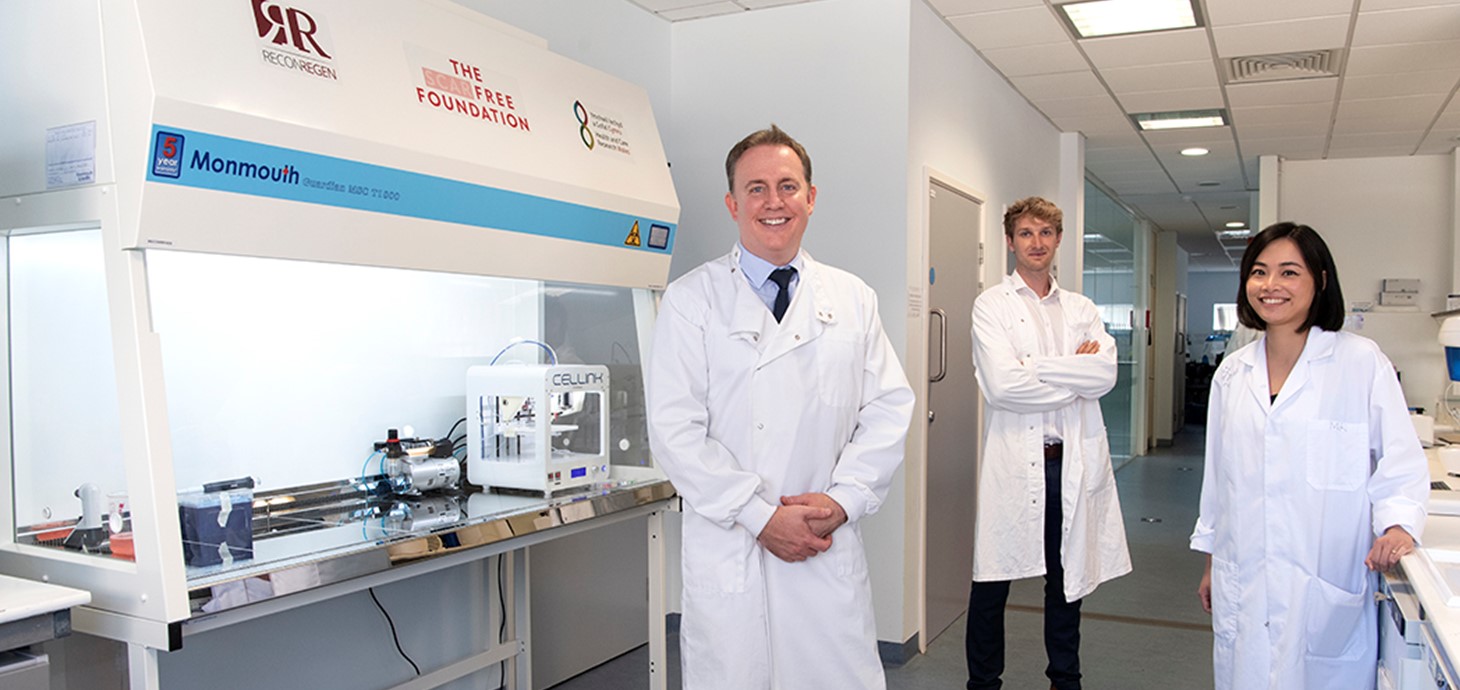
Prof Iain Whitaker (left), Tom Jovic and Cynthia De Courcey in the ReconRegen lab at Swansea University
A world-leading £2.5 million plus research programme to revolutionise surgeons’ ability to reconstruct nose and ear cartilage in patients affected by facial difference has been launched at Swansea University.
Funded by the Scar Free Foundation, the only medical research charity which focuses solely on scarring, and Health and Care Research Wales, the three-year programme will have a global impact – advancing not only 3D bioprinting of cartilage but also examining how facial scarring affects mental health by analysing data from the world’s largest cohort of people living with this visible difference.
The pioneering research will be led by Professor Iain Whitaker, Wales’s only professor of plastic surgery, Chair of Plastic Surgery at Swansea University Medical School and Surgical Specialty Lead for Health and Care Research Wales, at the Reconstructive Surgery & Regenerative Medicine Research Centre (ReconRegen).
Falklands veteran and the charity’s lead ambassador Simon Weston visited the team at their base in the University’s Medical School to take a closer look at the technology involved
He said: “It’s fantastic that this is taking place and what we are going to do is amazing. This new research – bioprinting ear and nose cartilage made from the patient’s own cells - would have made a big difference to me.”
Professor Whitaker said: “I am grateful for this significant investment and support which will accelerate our ongoing research efforts to offer pioneering treatment options and recruit further world-class researchers into Wales. Successful translation of this research programme will transform the future of surgery, removing the need to transfer tissue from one part of the body to another and avoid the associated pain and scarring.
“Although we are currently focused on cartilage, the scientific concepts and platform technologies our work is based on can be applied to tissue types such as blood vessel, nerve, bone, skin and fat which will enhance the impact significantly.”
The new programme builds on an initial study (supported by the Royal College of Surgeons) based on the Medical Research Council-funded PhD work of Zita Jessop, now a Senior Lecturer in the team, and other previous post-doctoral researchers. Subsequent PhD work was carried out by Tom Jovic, funded by Action Medical Research and Microtia UK.
One in 100 people in the UK have a significant facial difference, and this can have a profound effect on the mental health of patients so the funding will also result in the world’s largest study of people living with facial scars to assess the psychosocial impacts on patients so that effective healthcare strategies can be developed and appropriately targeted.
Professor Ann John, Professor in Public Health and Psychiatry at the Medical School said: “We live in a society that seems increasingly pre-occupied by appearance so there is a real need to understand the mental health consequences of facial scarring and their underlying causes.
“It’s vital we look at what might explain who, when and why people might be more strongly affected so we can do something about it early and develop new ways of managing and preventing these issues. While not as visible as the facial scar, these mental health problems can have long-term far-reaching impacts on lives and relationships. It is great to see this pioneering programme address these issues in tandem with surgical innovation.”
Brendan Eley, Chief Executive of the Scar Free Foundation, said: “This life-changing research is part of our commitment to achieve scar free healing within a generation for the millions of people living with scarring in the UK and across the world.”
The programme also includes a Health and Care Research Wales-funded project that will establish a comprehensive national overview of the nature and state of treatments and services currently provided to skin cancer patients across Wales, where group members Tom Dobbs and John Gibson will be working alongside Professor Whitaker to make recommendations for service redesign based on patient need.
